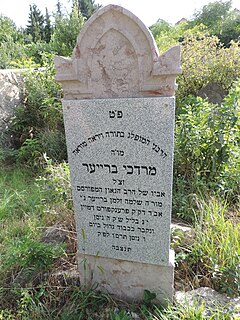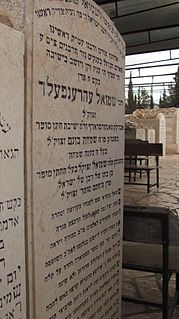Related Research Articles

Moses Schreiber (1762–1839), known to his own community and Jewish posterity in the Hebrew translation as Moshe Sofer, also known by his main work Chatam Sofer, Chasam Sofer, or Hatam Sofer, was one of the leading Orthodox rabbis of European Jewry in the first half of the nineteenth century.
Dushinsky is one of the few Hasidic dynasties not named after the place where it originated; instead, it is named after the surname of the Rebbe. It is a relatively new dynasty, as are many of the dynasties that originated in Hungary. However, the Dushinsky dynasty truly became a dynasty in Jerusalem, where it is centered today. It is not like other Hasidic groups, in that it does not originate from a Hasidic background, but from the talmidim (students) of the Chasam Sofer.
Moshe Schick was a prominent Hungarian Orthodox rabbi. In rabbinical commentary Shik is commonly known as the Maharam Schick ; Maharam is the Hebrew acronym for Moreinu Harav Moshe, which means "Our Teacher Rabbi Moses".
Chaim Shalom Tuvia Rabinowitz, also known as Reb Chaim Telzer, was an Orthodox Lithuanian rabbi and rosh yeshiva of the Telshe yeshiva. He developed a unique method of Talmudic analysis which became renowned throughout the yeshiva world as the Telzer Derech.

SolomonBreuer was a Hungarian-born German rabbi, initially in Pápa, Hungary, and from the early 1890s in Frankfurt as a successor of his father-in-law Samson Raphael Hirsch.

Shmuel HaLevi Wosner was a prominent Haredi rabbi and posek living in Bnei Brak, Israel. He was known as the Shevet HaLevi after his major work.

Avraham Shmuel Binyamin Sofer,, also known by his main work Ksav Sofer or Ketav Sofer, (1815–1871), was one of the leading rabbis of Hungarian Jewry in the second half of the nineteenth century and rosh yeshiva of the famed Pressburg Yeshiva. His official German name was Samuel Wolf Schreiber.

The Mekhilta of Rabbi Shimon bar Yochai is a Halakic midrash on Exodus from the school of Rabbi Akiva, attributed to Shimon bar Yochai. No midrash of this name is mentioned in Talmudic literature, but medieval authors refer to one which they call either "Mekhilta de-R. Simeon b. Yohai" or "Mekhilta Ahrita de-R. Shimon", or simply "Mekhilta Akheret".

Yosef Tzvi Dushinsky, also known as the Maharitz, was the first Rebbe of Dushinsky and Chief Rabbi (Gavad) of the Edah HaChareidis of Jerusalem.
The Pressburg Yeshiva, was the largest and most influential Yeshiva in Central Europe in the 19th century. It was founded in the city of Pressburg, Austrian Empire by Rabbi Moshe Sofer and was considered the largest Yeshiva since the time of the Babylonian Talmud.
Pressburg Yeshiva of Jerusalem is a leading yeshiva located in the Givat Shaul neighborhood of Jerusalem. It was founded in 1950 by Rabbi Akiva Sofer, a great-grandson of Rabbi Moses Sofer, who established the original Pressburg Yeshiva in the Austro-Hungarian Empire in 1807. As of 2009, the rosh yeshiva is Rabbi Simcha Bunim Sofer. After his death in 2017, his son Rabbi Avraham Shmuel Binyamin Sofer-Schreiber, who also serves as rosh kollel, succeeded him.

Yochanan Sofer was the Rebbe of the Erlau dynasty,which though not the largest in the number of its adherents is still a significant movement within Haredi Judaism. He was born in Eger (German: Erlau), Hungary, where his father and grandfather served as Grand Rabbis. After surviving the Holocaust, he continued their legacy by founding a yeshiva and a movement in their name, first in Hungary and then a few years later in Jerusalem.
Erlau, is a Haredi dynasty of Hungarian origin, which follows the teachings of the Chasam Sofer and is often considered Hasidic.

Shimon Sofer was the Rav of the Hungarian city of Eger (Erlau) and the progenitor of the Erlauer Hasidic dynasty. His grandson, Rabbi Yochanan Sofer, was the Erlauer Rebbe in Israel.

Shmuel Ehrenfeld, known as the Mattersdorfer Rav, was a pre-eminent Orthodox Jewish rabbi in pre-war Austria and a respected Torah leader and community builder in post-war America. He established Yeshivas Chasan Sofer in New York City and taught thousands of students who went on to become leaders of American Torah Jewry. He also founded the neighborhood of Kiryat Mattersdorf in Jerusalem, where his son and grandson became prominent Torah educators. He was the great-great-grandson of the Chasam Sofer through the Chasam Sofer's daughter Hindel, who married Rabbi Dovid Tzvi Ehrenfeld.
Jonathan Alexandersohn was a German-Hungarian rabbi.

Shimon Sofer (1820–1883) was a prominent Austrian Orthodox Jewish rabbi in the 19th century. He was Chief Rabbi of Kraków, Poland after serving as Chief Rabbi of Mattersdorf. He was the second son of Rabbi Moshe Sofer of Pressburg.
Moshe Sofer (II) (1885–1944) was a prominent Orthodox Jewish (Charedi) Rabbi in the early 20th century. He was Dayan of Erlau, Hungary and author of a halachic responsa sefer named Yad Sofer.
Yosef Yozpa Sofer 1819–1883 (Hebrew: יוסף יוזפא סופר) (German: Jozseph Jozspe Schreiber) was the third son of Rabbi Moshe Sofer of Pressburg, brother of Rabbi Samuel Benjamin Sofer and Rabbi Shimon Sofer.

Rabbi Yaakov Koppel Altenkunshtadt, also known as Reb Koppel Charif for his sharp intellect, was one of the leading Orthodox rabbis of Hungary in the first half of the nineteenth century. A peer of the famed Moses Sofer of Pressburg, Koppel Charif presided over what was at one time the largest and most prestigious yeshiva in Hungary.
References
- Beis Menucha Pressburg 1869, Shevet Shimon Vienna 1888; short biographies there.
- 1 2 "NNL Authorities". The National Library of Israel.